
So you’re Ruxbin and you’re riding the wave of good initial reviews, and seeing hour waits for a table between 6:30 and 8:30 on weeknights. But you need to work up a new menu for fall. So you… close down one of the hottest restaurants in town for a week.
Most people in the restaurant biz would call that crazy— would call it leaving money on the table, the way Grant Achatz apparently tried to get Michael Carlson to understand how much money he was leaving on the table by not having a wine program at Schwa. But Carlson is so focused on the food that he just couldn’t listen to that, and neither, apparently, can Edward Kim, the chef and co-owner (with his sister and another Korean friend named Kim) of this tiny, funky little restaurant on Ashland just north of Chicago Avenue. And it’s the kind of craziness that deserves cherishing, and championing.
Ruxbin is not another Schwa— it’s a more down-to-earth neighborhood restaurant, with dishes that sound like fairly plain American bistro food, with a touch of Asian fusion. With its thrift-shop look (like some Korean-American cross between Avec and Chicago Kalbi, with a little Amtrak sleeper coach thrown in), it looks more like the kind of place you’d find in a college town than in money-flashing 2010 Chicago. But besides the similarities to Schwa of being tiny, hard to get into and BYO on Ashland, you get the sense of a comparable degree of intensity, focus, and something like perfectionism in the food. According to Sula in the Reader, Kim “externed at [Thomas Keller’s] Per Se,” whatever that means; I think it means we don’t really know where he learned to cook, but we know who he admires, Mr. Obsessively Clear Broth himself. And as much as I have trouble with cooking totally Keller’s way myself, I’m fine when someone else feels they have to.
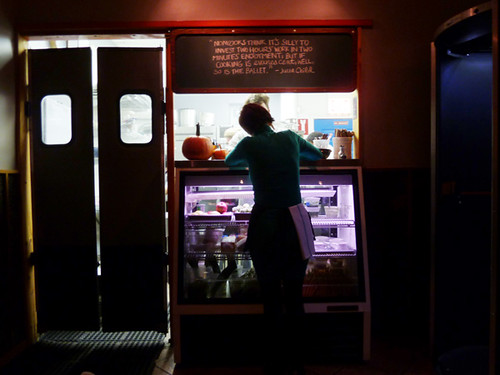
This was my second attempt to go to Ruxbin, and I’d learned from the first to be there by 6:30 at the latest, and to expect a wait. Ironic that in a restaurant decorated with book pages, it’s far too dark to read while waiting, but on the plus side, you get a front-row seat on the kitchen, which is Hong Kong-dense with cooks at work, yet surprisingly peaceful and purposeful, like everyone says Alinea’s is. That lack of the customary testosteronish bustle in the kitchen was perhaps the first clue that this place was professional beyond its years (or location, or budget).
Kim’s deftness with simple ingredients presented simply showed through in the first thing we had, a marvelous salad of sort of tempura-like eggplant slices, cucumber, golden beets and a yogurt sauce. The eggplant had a curious, nobody-can-eat-just-one texture (perhaps partly dehydrated before frying?), the yogurt sauce tasted of simple, honest dairy and herbs, the cucumber (milled into cylinders) and the surprising triangles of beets and the frisee made for new textural sensations with every bite.

Of our three appetizers, that was by far the best; calamari in a Korean chili sauce called bokkum was good, but would have been better still if the sauce had had more funk to it; it seemed like something I would have had at Ed’s Potsticker House, where it would have been half as much, twice as big and three times as funky. While an obligatory nod to the Korean taco-truck thing, an allegedly Korean empanada, was the one real dud of the meal; I might like these fine in a bar, they were fried nicely enough, but the pink goo inside had no particular character of note. If it was meant to be pureed kimchi, it was an argument for allowing kimchi to keep its original texture.
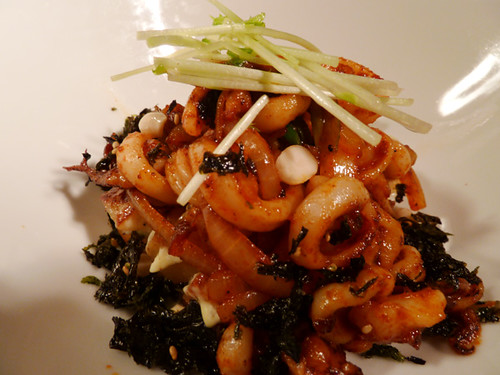
One great and one pretty good out of three is not that great a score, and I suspected that the appetizers would prove to be the highlights next to the almost defiantly plain sounding entrees, since they almost always are these days. But again, the most drab-sounding entree proved to be the most remarkable. I very much enjoyed the more inventive take on chicken and waffles, the most playful or deconstructionist item on the menu, which used a cumin-flavored waffle, slices of white meat chicken, “chicken carnitas” (a fancy, if presumptuous, name for pulled dark meat) and a “citrus gravy” (which didn’t add much). The only downside was that it was the kind of dish that takes so long to assemble that it wasn’t all that warm by the time it got to us.
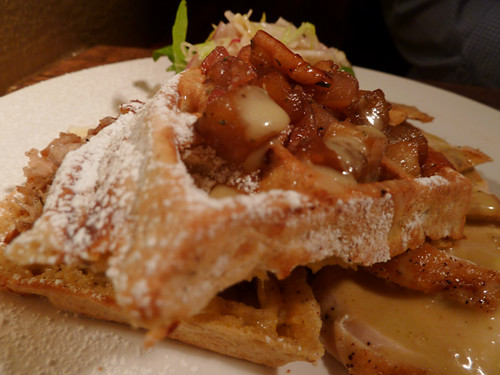
But in any case, it was bowled over by the trout, crisped to a slight char, sitting on surprisingly flavorful and robust bulgur wheat (cooked in something darkly wonderful), surrounded by basil sauce and topped with a few spears of asparagus and a couple of candied dates. It looks like hotel banquet food, but everything about it was just executed so well, was so full of rich, cold-weather flavor (yes, I know asparagus and basil are not fall produce, but the overall dish was autumnal just the same), that it was almost breathtakingly satisfying— comfort food at its most stimulatingly alert and intriguing.
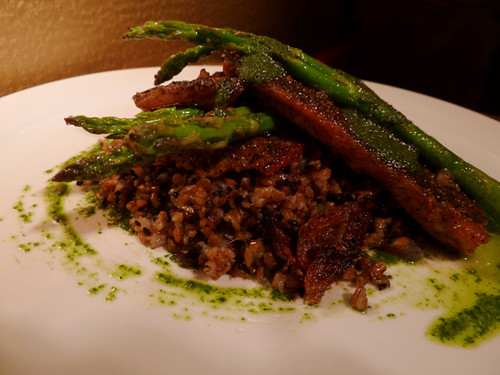
We finished with one of the only two desserts, coconut-lychee panna cotta, and it was a perfect end, Asian-light yet bright and happy. I would have this dessert with every meal for the next six months.

So it’s a bit of a stealth restaurant, the exterior not all that imposing (the crowds came from the internet) and the best dishes hiding under unsexy descriptions. But the excellence in execution at this early stage will make me interested to see what’s next every time they overhaul the menu (whether or not they shut down to do it); I expect them, like Schwa, to evolve quickly and impressively.
Michael Morowitz has given up foodblogging, but he emailed what he liked about Ruxbin to me the next day, and gave me permission to quote from it:
I think this place really represents what’s exciting about the Chicago restaurant scene. While explosive mega-trends (BBQ, gastropubs) are flaming out there still exists a strain of creative, food-focused, simple places like Ruxbin. It’s a child of Schwa in a lot of ways and of Mado in others (arguably two of the most exciting things to happen to Chicago’s restaurant scene in the last 5 years).
Ruxbin is a tiny BYOB with a frontiersman’s attitude toward opening a restaurant. They’re standing apart from the crowded restaurant scene, figuratively and literally. They’re focusing on solid execution and a fair bit of innovation while still acknowledging some trends and classics. They are not boasting about their gargantuan beer list or re-creation of a specific style of eating: they’re a family business hanging their shingle outside a tiny storefront… In the great European family bistro/trattoria tradition, there is simply a kitchen, some tables, and some good food.
I don’t especially agree that gastropubs are flaming out— but then I know that he just ate at one that greatly disappointed him, so he has reason to be jaundiced about that trend this week. Still, even as admirable a place as Longman & Eagle— which was a safe bet for my favorite restaurant opening of the year until I ate at Ruxbin— seems to be a savvy commercial player next to the almost monk-like, heads-down devotion to making excellent food, and doing nothing that would distract from that goal, here.
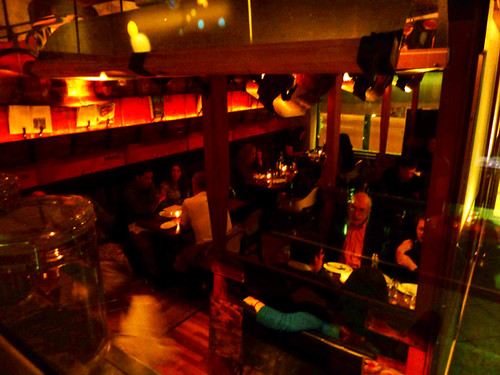
Ruxbin
851 N. Ashland
312.624.8509
Note: BYO; no reservations
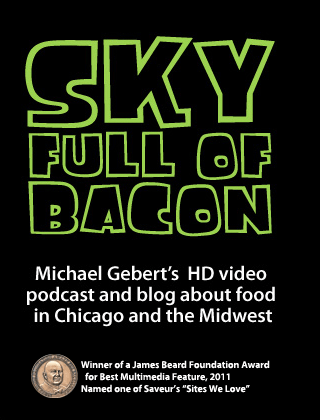

 If you like this post and would like to receive updates from this blog, please subscribe our feed.
If you like this post and would like to receive updates from this blog, please subscribe our feed.




